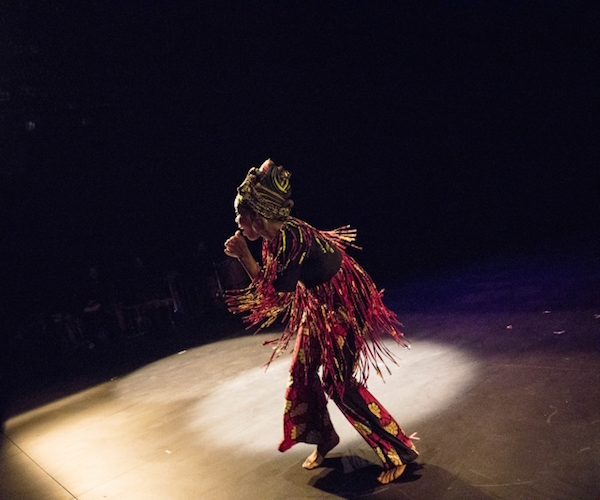Theater Review: “Hear Word! Nigerian Woman Talk True” — Speaking Truth to Power
Despite its drawbacks, this is a powerful production that speaks vibrantly to what is happening today.
Hear Word! Naija Woman Talk True, written by Ifeoma Fafunwa and others. Directed by Ifeoma Fafunwa. Staged by American Repertory Theater, Loeb Drama Center, 64 Brattle St., Cambridge, MA, through February 11.

Omonor in HEAR WORD! Naija Woman Talk True. Photo: Gretjen Helene Photography
By Robert Israel
The title of Hear Word! Naija Woman Talk True puts the emphasis on the singular: “woman.” But the script’s spirit is really plural — “women.” Ten Nigerian women make up the cast. (Three men, barely visible in the wings, accompany the cast members on percussive instruments.) They perform a series of vignettes that graphically illustrate the plight of Nigerian women, who are at the mercy of abusive men. Obviously these scenes are directed at a global community of women who cannot speak for themselves, an effort at what director Ifeoma Fafunwa calls generating “reckoning and change.” The message of this long one-act is to empower women, to encourage them to rise up against marginalization and to claim better lives.
The timing of the play is propitious. Nigerians and children of Nigerian immigrants are increasingly staking a claim in American theater and films via striking scripts and performances. And, of course, the #MeToo movement continues to inspire women to call out men who have abused their power by sexually harassing and mistreating females. Two weeks ago, in Cambridge and in dozens of cities around the globe, thousands of women rallied in support of this movement. The night before I attended the performance of Hear Word!, Congressional women representatives expressed their solidarity by wearing all-black to the State of the Union speech. Seated behind them, the Congressional Black Caucus wore swatches of kente cloth to symbolize their outrage at President Trump’s disparagement of African nations as “shitholes.”
Wearing full-length dresses woven from brightly woven kente cloth, the Nigerian women in Hear Word! command the Loeb Center’s large playing area, which has been cleared of props and distractions. Barefoot and continually animated, the cast frequently explodes into dance. Accompanied by drummers pummeling tom-toms, the women’s stomping bare feet and outstretched arms give voice to sorrows, joys, and all the struggles in between.
Amid the didacticism there are moments of humor, such as when the women gather in the marketplace to gossip. This is in contrast to a number of other scenes, where women describe being beaten and sexually violated. A woman declares herself to be “born again,” telling us how she had a vision of God when she had reached orgasm. This is juxtaposed with a scene that features a woman recounting how she is being sexually molested and swears to the authorities that, if she is forced to endure more violence, she will castrate her tormentor with a knife. (This declaration finally gets the attention of the authorities — but only after she has had to listen to accusations that, in some way, she must have contributed to her own abuse.)
Yet while the spirit of the performers – and their accompanists – is irrepressible, not all the scenes in this play work. This is principally due to the challenges the cast members face because of their strong accents; their enunciation of English, at times, becomes garbled. Listeners strain to understand what is being said; we end up baffled rather than inspired or informed. This difficulty with the performers’ diction blocks the show’s momentum, crabbing its pacing. At times, the director projects the dialogue on a screen at the back of the stage, but this helpful tool is not used often enough. (The same screen is employed to show scenes of the rural African village.) An easy remedy could be to use the screen to convey the dialogue throughout the production.
“It is deplorable for us to maltreat women, mothers, daughters, sisters, wives,” reads a translated chant from the Yoruba. “Neither is it acceptable for a woman to allow herself to be degraded or abused.” This message is emblazoned on the screen while the production’s women stand in front, arms raised in fists. It could easily serve as a sentiment on one of the banners at the next #MeToo rallies, anywhere/everywhere in the world. Ezra Pound opined that poetry “is news that stays news” — despite its drawbacks, this is a powerful production that speaks vibrantly to what is happening today.
Robert Israel writes about theater, travel, and the arts, and is a member of Independent Reviewers of New England (IRNE). He can be reached at risrael_97@yahoo.com
Tagged: American Repertory Theater, Hear Word!, Hear Word! Nigerian Woman Talk True
